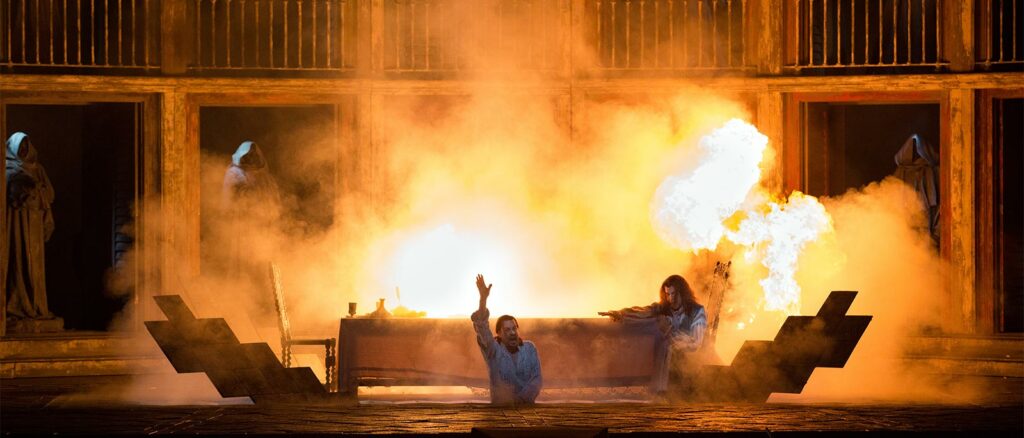
Not many of my friends like opera, but I do. Yes, it’s incessantly melodramatic, filled with extremes of human behavior, broadly comedic and invariably tragic, but that’s just what I like about it.
Opera is like life. Its main characters are tortured, and like Shakespeare’s, suffer the torments of love, hate, loyalty, betrayal, sweetness, suffering, exhilaration, depression, joy, sorrow, and death. And in the midst of all this, they produce volumes of thought and feeling, singing their hearts out in arias set to music that reflects their moods and the tumultuous nature of being.
Humanity’s entire cast of characters are included: sweet-natured heroes consumed by love, villainous tyrants obsessed with power, deceitful men and women driven by jealously, fanciful clowns with broken hearts, star-crossed young lovers, embittered old men, chums, enemies, bystanders, and saps. But wait, there’s more!
Life itself, in all its confused mischief and mayhem is included: vagaries of chance, elaborate plots of revenge, strivings for power, addiction to sex, irresistible greed, sweet innocence, terrible violence, personal redemption, eternal damnation, and of course, death. Tragic, noble, unpredictable, foreseeable, inevitable; in opera, as in life, at the end there is always death.
How we die; in opera it’s a reflection of how we live. Mozart’s Don Giovanni spends his life proudly pursuing women, lists his conquests and obsessions breathlessly, and dies knowing he will spend eternity in hell as the price for satisfying his selfish sexual ego. Verdi’s Otello is betrayed by his best friend, kills his beloved wife Desdemona in a rage of misplaced jealously, and dies in sorrow. Wagner’s Sigfried is bidden to love and death by a sacred vision that captures his entirety. Puccini’s Floria Tosca is a woman relentlessly pursued and abused by the sadistic and murderous police chief Baron Scarpia, who she stabs in the heart. Mugorsky’s Boris Gudenov is a Czar tortured by the burden of leadership; he collapses and dies in sorrow and terror. You get the picture.
Not everything is so well wrapped up in ordinary life, where villains die comfortably of old age in their own beds, heroes go to their graves unknown and unacknowledged, married couples live out tortured lives together in bitterness, and the well-deserving silently die in poverty and loneliness. Shit happens; we come to terms with it, or we don’t.
Unlike opera, in real life there’s no libretto, but like opera, death always comes at the end. Thus the question, how best to live? The nature of our dying may not reflect how we’ve lived, but we all have the opportunity play our part, to write our own libretto as best we can, choose to die a forgotten bystander or having sung a soaring aria about right and wrong.
Although I have pretentions to sing baritone, in this current opera I’m more of a tenor, admittedly naive and too high-pitched at times. I tear at my chest and cry out to heaven “Save my family, my friends and the town I love!” You never know who’s listening.
I’m thinking about what music I’d like played at my funeral. If this sounds morbid and self-indulgent, well, it is. At my age, death frequently reveals his shadowed face. Yet, as messy, unpredictable, and unpleasant as life can be, like opera, I still think it’s a thrill, and as I’ve noted before, I’d be delighted to come back for another performance, if that’s an option.
great writing Larry
one of your best
thanks for all your efforts
Thanks, Charles.